中国文化用英语怎么说
- 格式:doc
- 大小:188.50 KB
- 文档页数:71
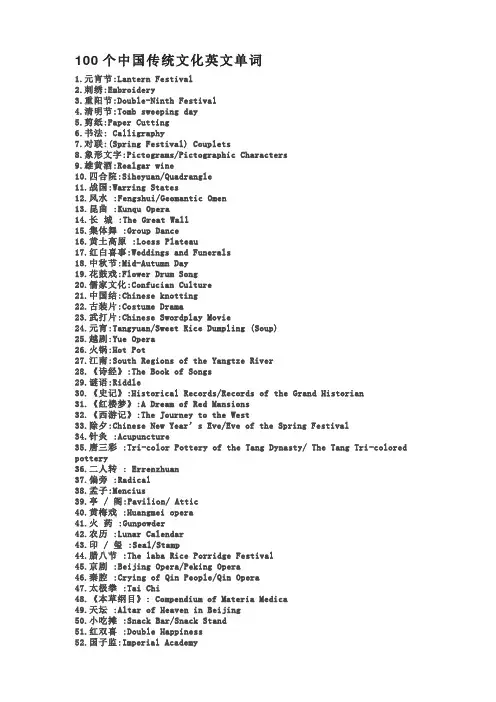
100个中国传统文化英文单词1.元宵节:Lantern Festival2.刺绣:Embroidery3.重阳节:Double-Ninth Festival4.清明节:Tomb sweeping day5.剪纸:Paper Cutting6.书法: Calligraphy7.对联:(Spring Festival) Couplets8.象形文字:Pictograms/Pictographic Characters9.雄黄酒:Realgar wine10.四合院:Siheyuan/Quadrangle11.战国:Warring States12.风水 :Fengshui/Geomantic Omen13.昆曲 :Kunqu Opera14.长城 :The Great Wall15.集体舞 :Group Dance16.黄土高原 :Loess Plateau17.红白喜事:Weddings and Funerals18.中秋节:Mid-Autumn Day19.花鼓戏:Flower Drum Song20.儒家文化:Confucian Culture21.中国结:Chinese knotting22.古装片:Costume Drama23.武打片:Chinese Swordplay Movie24.元宵:Tangyuan/Sweet Rice Dumpling (Soup)25.越剧:Yue Opera26.火锅:Hot Pot27.江南:South Regions of the Yangtze River28.《诗经》:The Book of Songs29.谜语:Riddle30.《史记》:Historical Records/Records of the Grand Historian31.《红楼梦》:A Dream of Red Mansions32.《西游记》:The Journey to the West33.除夕:Chinese New Year’s Eve/Eve of the Spring Festival34.针灸 :Acupuncture35.唐三彩 :Tri-color Pottery of the Tang Dynasty/ The Tang Tri-colored pottery36.二人转 : Errenzhuan37.偏旁 :Radical38.孟子:Mencius39.亭 / 阁:Pavilion/ Attic40.黄梅戏 :Huangmei opera41.火药 :Gunpowder42.农历 :Lunar Calendar43.印 / 玺 :Seal/Stamp44.腊八节 :The laba Rice Porridge Festival45.京剧 :Beijing Opera/Peking Opera46.秦腔 :Crying of Qin People/Qin Opera47.太极拳 :Tai Chi48.《本草纲目》: Compendium of Materia Medica49.天坛 :Altar of Heaven in Beijing50.小吃摊 :Snack Bar/Snack Stand51.红双喜 :Double Happiness52.国子监:Imperial Academy53.春卷 :Spring Roll(s)54.莲藕 :Lotus Root55.罗盘 :Luopan56.故宫博物院 :The Palace Museum57.相声:Cross-talk/Comic Dialogue58.五行 :Five Phases59.北京烤鸭 : Beijing Roast Duck60.《桃花扇》:The Peach Blossom Fan61.木偶戏:Puppet Show62.敦煌莫高窟:Mogao Caves63.电视小品:TV Sketch/TV Skit64.甲骨文:Oracle Bone Inscriptions65.古筝:Chinese Zither66.二胡 :Urheen67.门当户对:Perfect Match/Exact Match68.《水浒》: Water Margin/Outlaws of the Marsh69.端午节:Dragon Boat Festival70.文房四宝:“The Four Treasure of the Study” “Brush, Inkstick, Paper and Inkstone”71.兵马俑: Cotta Warriors/ Terracotta Army72.旗袍:Cheongsam73.指南针:Compass74.泼水节:Water-Splashing Day75.馄饨:Wonton76. 花卷:Steamed twisted rolls77.羊肉泡馍:Pita Bread Soaked in Lamb Soup78.冰糖葫芦:A stick of sugar-coated haws (or apples, etc.)79.八宝饭:Eight-treasure rice pudding80.粉丝:Glass Noodles81.豆腐脑:Jellied bean curd82.小品:Witty Skits83.孝顺:To show filial obedience84.武术:Wushu (Chinese Martial Arts)85.宣纸:Rice Paper86.衙门: Yamen87.叩头:Kowtow88.中庸:The way of medium(cf. Golden Means)89.牌楼:Pailou (pai-loo)90.东坡肉:Dongpo Pork91.中山陵:The Sun Yat-sen Mausoleum92.秦淮河:Qinhuai River93.玄武湖:Xuanwu Lake94.夫子庙:The Confucian Temple95.鸭血粉丝:Duck blood and Vermicelli Soup96.盐水鸭:Yanshuiya, or salted and baked duck97.大煮干丝:Gansi98.小笼包:Steamed buns99.明孝陵:Ming Tomb100.云锦:Nanjing brocade。
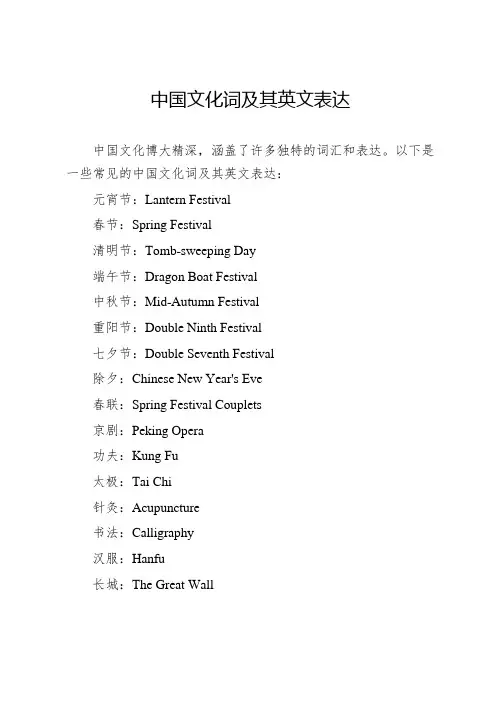
中国文化词及其英文表达中国文化博大精深,涵盖了许多独特的词汇和表达。
以下是一些常见的中国文化词及其英文表达:元宵节:Lantern Festival春节:Spring Festival清明节:Tomb-sweeping Day端午节:Dragon Boat Festival中秋节:Mid-Autumn Festival重阳节:Double Ninth Festival七夕节:Double Seventh Festival除夕:Chinese New Year's Eve春联:Spring Festival Couplets京剧:Peking Opera功夫:Kung Fu太极:Tai Chi针灸:Acupuncture书法:Calligraphy汉服:Hanfu长城:The Great Wall故宫:The Forbidden City孔子:Confucius儒家文化:Confucian Culture道家文化:Taoist Culture四大发明:Four Great Inventions (gunpowder, printing, compass, paper-making)十二生肖:Zodiac (Rat, Ox, Tiger, Rabbit, Dragon, Snake, Horse, Sheep, Monkey, Rooster, Dog, Pig)五行:Five Elements (Wood, Fire, Earth, Metal, Water)风水:Feng Shui旗袍:Cheongsam中药:Traditional Chinese Medicine茶文化:Tea Culture杂技:Acrobatics皮影戏:Shadow Play中国画:Chinese Painting这些只是中国文化中的一小部分词汇,实际上中国文化博大精深,涵盖了更多的词汇和表达。
学习和了解这些词汇,有助于我们更好地理解和欣赏中国文化的独特魅力。
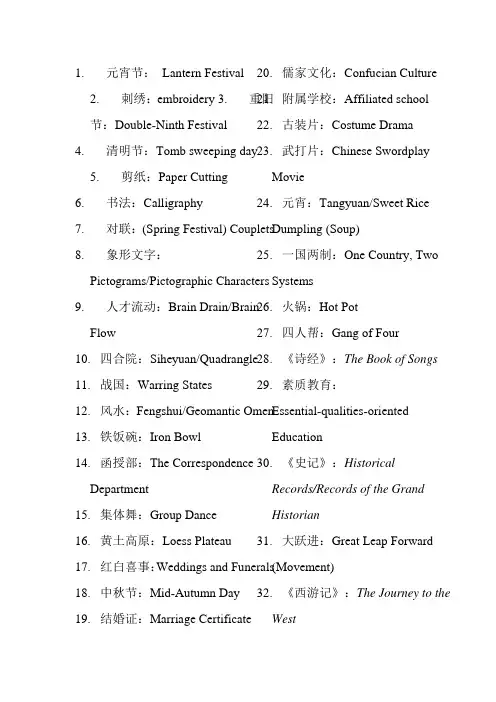
1. 元宵节: Lantern Festival2. 刺绣:embroidery3. 重阳节:Double-Ninth Festival4. 清明节:Tomb sweeping day5. 剪纸:Paper Cutting6. 书法:Calligraphy7. 对联:(Spring Festival) Couplets 8. 象形文字:Pictograms/Pictographic Characters 9. 人才流动:Brain Drain/Brain Flow10. 四合院:Siheyuan/Quadrangle 11. 战国:Warring States12. 风水:Fengshui/Geomantic Omen 13. 铁饭碗:Iron Bowl14. 函授部:The Correspondence Department15. 集体舞:Group Dance 16. 黄土高原:Loess Plateau17. 红白喜事:Weddings and Funerals18. 中秋节:Mid-Autumn Day 19. 结婚证:Marriage Certificate 20. 儒家文化:Confucian Culture 21. 附属学校:Affiliated school 22. 古装片:Costume Drama23. 武打片:Chinese Swordplay Movie24. 元宵:Tangyuan/Sweet RiceDumpling (Soup) 25. 一国两制:One Country, TwoSystems 26. 火锅:Hot Pot 27. 四人帮:Gang of Four28. 《诗经》:The Book of Songs 29. 素质教育:Essential-qualities-oriented Education30. 《史记》:Historical Records/Records of the Grand Historian31. 大跃进:Great Leap Forward(Movement) 32. 《西游记》:The Journey to the West33. 除夕:Chinese New Year’sEve/Eve of the Spring Festival34. 针灸:Acupuncture35. 唐三彩:Tri-color Pottery of theTang Dynasty/ The TangTri-colored pottery36. 中国特色的社会主义:Chinese-characteredSocialist/Socialist with Chinesecharacteristics37. 偏旁:radical38. 孟子:Mencius39. 亭/阁:Pavilion/ Attic40. 大中型国有企业:Large andMedium-sized State-ownedEnterprises41. 火药:gunpowder42. 农历:Lunar Calendar43. 印/玺:Seal/Stamp44. 物质精神文明建设:TheConstruction of MaterialCivilization and Spiritual Civilization45. 京剧:Beijing Opera/Peking Opera46. 秦腔:Crying of Qin People/QinOpera47. 太极拳:Tai Chi48. 独生子女证:The Certificate ofOne-child49. 天坛:Altar of Heaven in Beijing50. 小吃摊:Snack Bar/Snack Stand51. 红双喜:Double Happiness52. 政治辅导员:PoliticalCounselor/School Counselor53. 春卷:Spring Roll(s)54. 莲藕:Lotus Root55. 追星族:Star Struck56. 故宫博物院:The Palace Museum57. 相声:Cross-talk/Comic Dialogue58. 下岗:Lay off/Laid off59. 北京烤鸭:Beijing Roast Duck60. 高等自学考试:Self-taughtExamination of Higher Education 61. 烟花爆竹:fireworks andfirecracker62. 敦煌莫高窟:Mogao Caves63. 电视小品:TV Sketch/TV Skit64. 香港澳门同胞:Compatriots fromHong Kong and Macao65. 文化大革命:Cultural Revolution66. 长江中下游地区:The Mid-lowReaches of Yangtze River67. 门当户对:Perfect Match/ExactMatch68. 《水浒》:Water Margin/Outlawsof the Marsh69. 中外合资企业:Joint Ventures70. 文房四宝(笔墨纸砚):"The FourTreasure of the Study" "Brush,Inkstick, Paper, and Inkstone",有些英语,不能不懂装懂!——值得保留的an apple of love 西红柿(不是“爱情之果”)American beauty 一种玫瑰,名为“美国丽人”(不是“美国美女”)be taken in 受骗,上当(不是“被接纳”)bring down the house 博得全场喝彩(不是“推倒房子”)black tea 红茶(不是“黑茶”)black art 妖术(不是“黑色艺术”)black stranger 完全陌生的人(不是“陌生的黑人”)busboy 餐馆勤杂工(不是“公汽售票员”)busybody 爱管闲事的人(不是“大忙人”)blue stocking 女学者、女才子(不是“蓝色长统袜”)blind date (由第三者安排的)男女初次会面(并非“盲目约会”或“瞎约会”)capital idea 好主意(不是“资本主义思想”)China policy 对华政策(不是“中国政策”)Chinese dragon 麒麟(不是“中国龙”)confidence man 骗子(不是“信得过的人”)criminal lawyer 刑事律师(不是“犯罪的律师”)dead president 美钞(上印有总统头像)(并非“死了的总统”)dry goods (美)纺织品;(英)谷物(不是“干货”)dressing room 化妆室(不是“试衣室”或“更衣室”)eat one's words 收回前言(不是“食言”)English disease 软骨病(不是“英国病”)eleventh hour 最后时刻(不是“十一点”)familiar talk 庸俗的交谈(不是“熟悉的谈话”)French chalk 滑石粉(不是“法国粉笔”)Greek gift 害人的礼品(不是“希腊礼物”)green hand 新手(不是“绿手”)handwriting on the wall 不祥之兆(不是“大字报”)have a fit 勃然大怒(不是“试穿”)have the heart to do (用于否定句)忍心做……不是“有心做”或“有意做”)heartman 换心人(不是“有心人”)horse sense 常识(不是“马的感觉”)Indian summer 愉快宁静的晚年(不是“印度的夏日”)in one's birthday suit 赤身裸体(不是“穿着生日礼服”)lover 情人(不是“爱人”)mad doctor 精神病科医生(不是“发疯的医生”)personal remark 人身攻击(不是“个人评论”)pull up one's socks 鼓起勇气(不是“提上袜子”)red tape 官僚习气(不是“红色带子”)rest room 厕所(不是“休息室”)sporting house 妓院(不是“体育室”)sweet water 淡水(不是“糖水”或“甜水”)service station 加油站(不是“服务站”)Spanish athlete 吹牛的人(不是“西班牙运动员”)think a great deal of oneself 高看或看重自己(不是“为自己想得很多”)white coal (作动力来源用的)水(不是“白煤”)white man 忠实可靠的人(不是“皮肤白的人”)yellow book 黄皮书(法国政府报告书,以黄纸为封)(不是“黄色书籍”)pull one's leg 开玩笑(不是“拉后腿”)make one's hair stand on end 令人毛骨悚然—恐惧(不是“令人发指,气愤”)What a shame! 多可惜!真遗憾!(不是“多可耻”)You don't say! 是吗!(不是“你别说”)You can say that again! 说得好!(不是“你可以再说一遍”)I haven't slept better. 我睡得好极了。
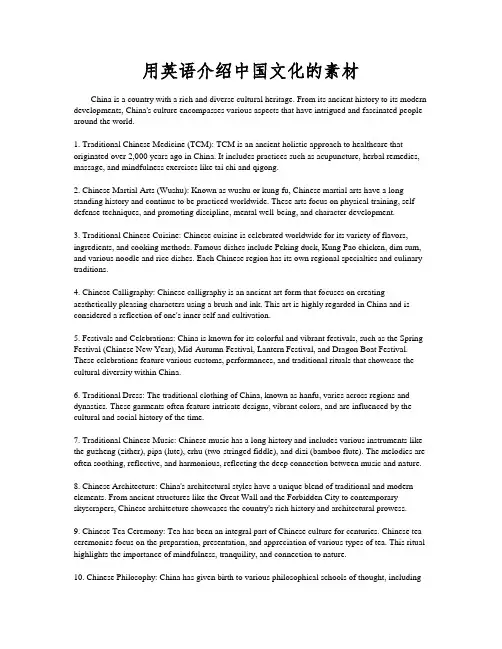
用英语介绍中国文化的素材China is a country with a rich and diverse cultural heritage. From its ancient history to its modern developments, China's culture encompasses various aspects that have intrigued and fascinated people around the world.1. Traditional Chinese Medicine (TCM): TCM is an ancient holistic approach to healthcare that originated over 2,000 years ago in China. It includes practices such as acupuncture, herbal remedies, massage, and mindfulness exercises like tai chi and qigong.2. Chinese Martial Arts (Wushu): Known as wushu or kung fu, Chinese martial arts have a long-standing history and continue to be practiced worldwide. These arts focus on physical training, self-defense techniques, and promoting discipline, mental well-being, and character development.3. Traditional Chinese Cuisine: Chinese cuisine is celebrated worldwide for its variety of flavors, ingredients, and cooking methods. Famous dishes include Peking duck, Kung Pao chicken, dim sum, and various noodle and rice dishes. Each Chinese region has its own regional specialties and culinary traditions.4. Chinese Calligraphy: Chinese calligraphy is an ancient art form that focuses on creating aesthetically pleasing characters using a brush and ink. This art is highly regarded in China and is considered a reflection of one's inner self and cultivation.5. Festivals and Celebrations: China is known for its colorful and vibrant festivals, such as the Spring Festival (Chinese New Year), Mid-Autumn Festival, Lantern Festival, and Dragon Boat Festival. These celebrations feature various customs, performances, and traditional rituals that showcase the cultural diversity within China.6. Traditional Dress: The traditional clothing of China, known as hanfu, varies across regions and dynasties. These garments often feature intricate designs, vibrant colors, and are influenced by the cultural and social history of the time.7. Traditional Chinese Music: Chinese music has a long history and includes various instruments like the guzheng (zither), pipa (lute), erhu (two-stringed fiddle), and dizi (bamboo flute). The melodies are often soothing, reflective, and harmonious, reflecting the deep connection between music and nature.8. Chinese Architecture: China's architectural styles have a unique blend of traditional and modern elements. From ancient structures like the Great Wall and the Forbidden City to contemporary skyscrapers, Chinese architecture showcases the country's rich history and architectural prowess.9. Chinese Tea Ceremony: Tea has been an integral part of Chinese culture for centuries. Chinese tea ceremonies focus on the preparation, presentation, and appreciation of various types of tea. This ritual highlights the importance of mindfulness, tranquility, and connection to nature.10. Chinese Philosophy: China has given birth to various philosophical schools of thought, includingConfucianism, Taoism, and Buddhism. These philosophies have influenced Chinese culture, ethics, and social interactions, emphasizing virtues such as harmony, respect, balance, and spiritual exploration.China's cultural heritage is an extraordinary tapestry woven with history, traditions, arts, wisdom, and the pursuit of a harmonious life. It continues to inspire and captivate people, offering a glimpse into a vibrant and deep-rooted civilization.。
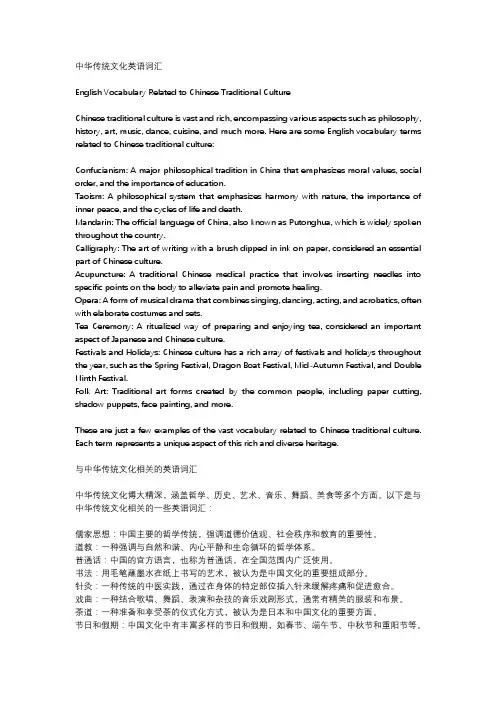
中华传统文化英语词汇English Vocabulary Related to Chinese Traditional CultureChinese traditional culture is vast and rich, encompassing various aspects such as philosophy, history, art, music, dance, cuisine, and much more. Here are some English vocabulary terms related to Chinese traditional culture:Confucianism: A major philosophical tradition in China that emphasizes moral values, social order, and the importance of education.Taoism: A philosophical system that emphasizes harmony with nature, the importance of inner peace, and the cycles of life and death.Mandarin: The official language of China, also known as Putonghua, which is widely spoken throughout the country.Calligraphy: The art of writing with a brush dipped in ink on paper, considered an essential part of Chinese culture.Acupuncture: A traditional Chinese medical practice that involves inserting needles into specific points on the body to alleviate pain and promote healing.Opera: A form of musical drama that combines singing, dancing, acting, and acrobatics, often with elaborate costumes and sets.Tea Ceremony: A ritualized way of preparing and enjoying tea, considered an important aspect of Japanese and Chinese culture.Festivals and Holidays: Chinese culture has a rich array of festivals and holidays throughout the year, such as the Spring Festival, Dragon Boat Festival, Mid-Autumn Festival, and Double Ninth Festival.Folk Art: Traditional art forms created by the common people, including paper cutting, shadow puppets, face painting, and more.These are just a few examples of the vast vocabulary related to Chinese traditional culture. Each term represents a unique aspect of this rich and diverse heritage.与中华传统文化相关的英语词汇中华传统文化博大精深,涵盖哲学、历史、艺术、音乐、舞蹈、美食等多个方面。
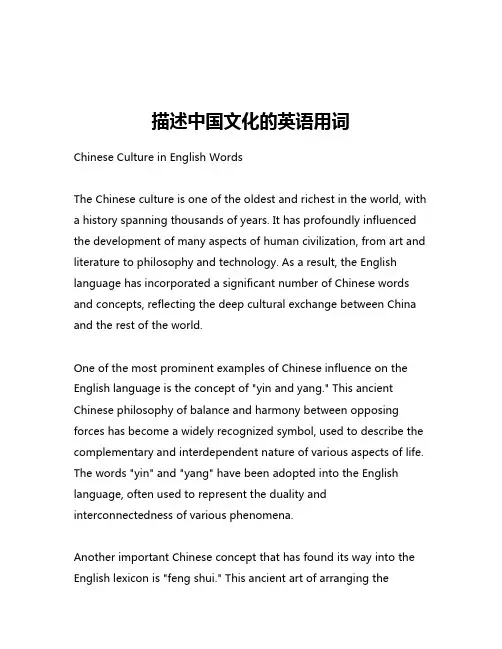
描述中国文化的英语用词Chinese Culture in English WordsThe Chinese culture is one of the oldest and richest in the world, with a history spanning thousands of years. It has profoundly influenced the development of many aspects of human civilization, from art and literature to philosophy and technology. As a result, the English language has incorporated a significant number of Chinese words and concepts, reflecting the deep cultural exchange between China and the rest of the world.One of the most prominent examples of Chinese influence on the English language is the concept of "yin and yang." This ancient Chinese philosophy of balance and harmony between opposing forces has become a widely recognized symbol, used to describe the complementary and interdependent nature of various aspects of life. The words "yin" and "yang" have been adopted into the English language, often used to represent the duality and interconnectedness of various phenomena.Another important Chinese concept that has found its way into the English lexicon is "feng shui." This ancient art of arranging thephysical environment to promote harmony and well-being has become a popular practice worldwide. The term "feng shui" is commonly used to refer to the strategic placement of objects, furniture, and even buildings to create a sense of balance and flow.The Chinese language has also gifted the English language with numerous words related to cuisine and culinary traditions. Terms such as "dim sum," "wok," "chop suey," and "kung pao" have become ubiquitous in Western culinary vocabulary, reflecting the global influence of Chinese cuisine. These words not only describe specific dishes and cooking methods but also convey the rich cultural heritage and flavors of China.Beyond the realm of food, Chinese culture has left an indelible mark on the English language through the introduction of various cultural artifacts and practices. The word "kowtow," which means to show deep respect or submission, is derived from the Chinese practice of kneeling and touching the forehead to the ground. Similarly, the term "tai chi" refers to the ancient Chinese martial art and meditation practice, which has gained widespread popularity worldwide.The influence of Chinese culture on the English language extends to the realm of philosophy and spirituality as well. The concept of "karma," which refers to the principle of cause and effect in one's actions, has been adopted into the English language, reflecting theprofound impact of Buddhist and Hindu teachings. Additionally, the term "mantra," which originally referred to sacred chants or phrases in Sanskrit, has become a widely used word in English to describe a repeated phrase or slogan that is used for focused meditation or affirmation.Furthermore, the Chinese language has contributed numerous words related to traditional Chinese medicine and healing practices. Terms such as "acupuncture," "chi," and "ginseng" have become integral parts of the English vocabulary, reflecting the growing interest and appreciation for Eastern medical approaches in the West.In the realm of technology and innovation, the Chinese language has also left its mark on the English language. The word "kw'an" (or "quan"), which means "circle" or "loop," is the root of the term "algorithm," a fundamental concept in computer science and mathematics.The influence of Chinese culture on the English language is not limited to individual words and concepts; it has also shaped the way we communicate and express ourselves. The Chinese philosophy of indirectness and subtlety has influenced the use of language, leading to the incorporation of phrases like "saving face" and "reading between the lines" into the English lexicon.In conclusion, the deep and lasting impact of Chinese culture on the English language is a testament to the interconnectedness of global cultures and the ongoing exchange of ideas and knowledge. As the world becomes increasingly globalized, the continued integration of Chinese words and concepts into the English language will undoubtedly continue, further enriching and expanding the linguistic landscape.。
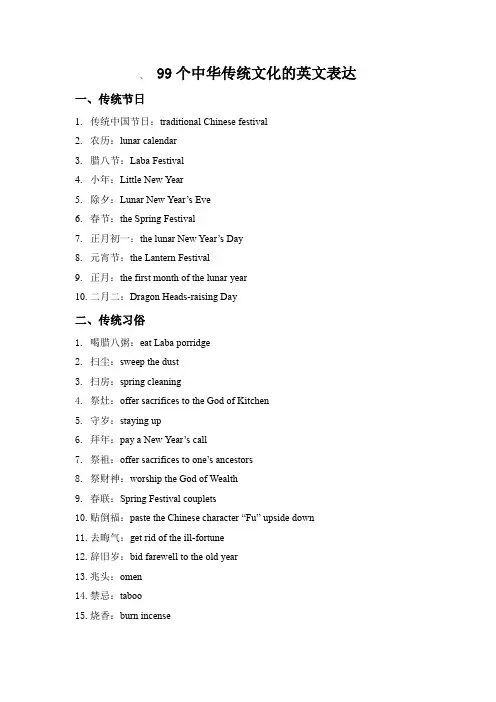
、 99个中华传统文化的英文表达一、传统节日1.传统中国节日:traditional Chinese festival2.农历:lunar calendar3.腊八节:Laba Festival4.小年:Little New Year5.除夕:Lunar New Year’s Eve6.春节:the Spring Festival7.正月初一:the lunar New Year’s Day8.元宵节:the Lantern Festival9.正月:the first month of the lunar year10.二月二:Dragon Heads-raising Day二、传统习俗1. 喝腊八粥:eat Laba porridge2. 扫尘:sweep the dust3. 扫房:spring cleaning4. 祭灶:offer sacrifices to the God of Kitchen5. 守岁:staying up6. 拜年:pay a New Year’s call7. 祭祖:offer sacrifices to one’s ancestors8. 祭财神:worship the God of Wealth9. 春联:Spring Festival couplets10.贴倒福:paste the Chinese character “Fu” upside down11.去晦气:get rid of the ill-fortune12.辞旧岁:bid farewell to the old year13.兆头:omen14.禁忌:taboo15.烧香:burn incense三、阖家团圆1. 吃团圆饭:have a family reunion dinner2. 年夜饭:New Year’s Eve dinner3. 全家团圆:family reunion4. 办年货:do Spring Festival shopping5. 敬酒:propose a toast6. 穿新衣:wear new clothes7. 红包:red envelops8. 压岁钱:gift money; money given to children as a Lunar New Year gift四、美食小吃1. 年糕:rice cake; New Year cake2. 饺子:dumpling; Chinese meat ravioli3. 汤圆:dumplings made of sweet rice4. 八宝饭:eight-treasure rice pudding (steamed glutinous rice with bean paste, lotus seeds, preserved fruit, etc.)5. 什锦糖:assorted candies6. 花生糖:peanut candy7. 蜜冬瓜:candied winter melon8. 糖莲子:candied lotus seed9. 瓜子:red melon seeds10.金桔:cumquat11.红枣:red dates12.春卷:spring roll13.冰糖葫芦:candied haws on a stick14.驴肉火烧:donkey burger15.腊肠:Chinese sausage16.米酒:rice wine17.腊肉:preserved meat18.糖板栗:sugar chestnut19.四喜丸子:four-joy meatballs五、民间艺术1. 泥人:clay figure2. 皮影戏:shadow puppetry3. 木偶戏:puppet show4. 刺绣:embroidery5. 剪纸:paper-cut6. 中国结:Chinese knot7. 年画:New Year painting8. 吹糖人:sugar-figure blowing9. 舞龙:dragon dance10.舞狮:lion dance六、曲艺表演1. 戏曲:traditional opera2. 折子戏:opera highlights3. 相声:comic dialogue; cross talk4. 小品:skits; sketch5. 口技:vocal imitations; ventriloquism6. 杂技:acrobatic performance7. 马戏:circus performance8. 京韵大鼓:drum song of Peking9. 踩高跷:walk on stilts10.杂耍:variety show; vaudeville七、娱乐活动1. 打麻将:play mahjong2. 庙会:Temple Fair3. 春节联欢晚会:Spring Festival gala4. 灯会:exhibit of lanterns5. 送贺卡:sending New Year’s greeting cards6. 理发:have a haircut7. 放烟花:set off fireworks8. 放鞭炮:set off firecrackers9. 灯谜:riddles written on lanterns八、其他1. 门神:the God of Door2. 灶神:the God of Kitchen3. 财神:the God of Wealth4. 土地爷:the God of Land5. 火神:the God of Fire6. 喜神:the God of Happiness7. 福寿禄三星:the three gods of fortune, prosperity and longevity8. 八仙:the Eight Immortals9. 生肖、属相:Chinese zodiac10.猪年:the year of the Pig11.微信红包:WeChat red envelope12.年:Nian; Year monster13.本命年:the animal year in which one was born14.春运:Spring Festival travel rush15.24节气: 24 Solar Terms16.立春:the Beginning of Spring17.雨水:Rain Water18.惊蛰:the Waking of Insects19.春分:the Spring Equinox20.清明:Pure Brightness21.谷雨:Grain Rain22.立夏:the Beginning of Summer23.小满:Lesser Fullness of Grain24.芒种:Grain in Beard25.夏至:the Summer Solstice26.小暑:Lesser Heat27.大暑:Greater Heat28.立秋:the Beginning of Autumn29.处暑:the End of Heat30.白露:White Dew31.秋分:the Autumn Equinox32.寒露:Cold Dew33.霜降:Frost’s Descent34.立冬:the Beginning of Winter35.小雪:Lesser Snow36.大雪:Greater Snow37.冬至:the Winter Solstice38.小寒:Lesser Cold39.大寒:Greater Cold。
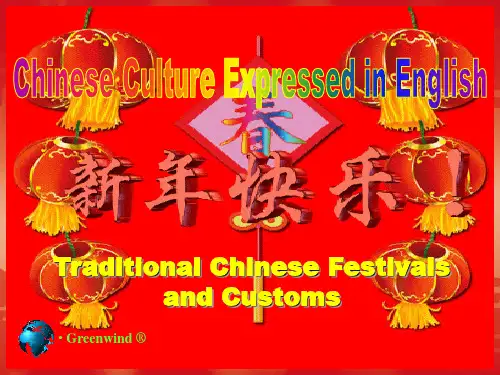
Traditional Chinese Festivalsand Customs•Greenwind ®Contents ♦Leading in♦The Spring Festival♦The Lantern Festival♦The Dragon Boat Festival♦Mid-Autumn Festival♦Double Seventh Day♦Double Ninth Day♦Pure Brightness♦More Days♦Make a conversation about recreational activities♦Become familiar with Chinese Festivals♦Become familiar with what traditional Chinese Festivals mean to Chinese people♦Be able to make the conversations about recreational activities♦Understand some words and expressions relating to festivals.Holiday HolidayWork in pairs discussing the following questions, and then share your answerswith the whole class.1. What activities do you do to relax in your spare time?2. What kinds of legal holidays are there in China?3. How do you arrange your holidays?4. Do you think people need holidays? (Why?or why not?)Leading in ♦What do youknow aboutChineseFestivals?♦What do peopledo duringChineseFestivals?· What do Chinese people often do before the Spring Festival?· What is the traditional food of the Lantern Festival?· What do the Chinese often do on the New Year’s Eve?· Why do people visit the tombs of their dead relatives during the Qingming Festival?· How did the tradition of eating Zongzi and holding dragon boat contests come into being?CHECK YOUR UNDERSTANDING Mark “”for true and“”for false.( ) 1. Chinese people celebrate the coming of a blessed new year at the end of every lunar year and that is called Spring Festival.( ) 2. People clean and decorate their houses during the last month before the Spring Festival.( ) 3. There are usually lantern fairs on the 15th day after the New Year ’s Day.( ) 4. Traditionally, people go to visit the tombs of their ancestors and lay wreaths of flowers before the tombs on the Qingming Festival.( ) 5. To the Chinese people, the full moon in the 8th month of the lunar year means the reunion of family members.√√√√√Important Traditional ChineseFestivals♦The Spring Festival♦The Lantern Festival♦The Dragon Boat Festival♦The Pure Brightness Festival♦The Mid-Autumn Festival♦The Double Seventh Day♦The Double Ninth DayThe Spring Festival♦Also known as the Chinese New Year ♦The most important and comprehensive festival.♦It falls on the first day of the first Chinese lunar month and the celebration lasts from the 23rd of the 12th lunar month up to the fifteenth of the first lunar month next year.♦When do we have it?Traditional Customs Relating To The Spring FestivalWriting andPasting coupletson doorsWhat do we doTraditional Customs Relating To The Spring FestivalCreatingpaper-cuts forwindowdecorationPaper-Cut: Happy New YearPaper-Cutting Is Now A Popular Art Creatingpaper-cutsfor windowdecorationTraditional Customs Relating To The Spring Festival♦Setting off fire-crackers♦(The favoriteactivity of children,which is said todrive off evil spiritsaccording to legend)Traditional Customs Relating To The Spring FestivalChildrenGetting luckymoney in redenvelopesfrom theirparents andrelativesThe Spring Festival The lion and dragon dancingThe Spring Festival ♦Eating Jiaozi♦( first known in Chinasome 1,600 years ago.♦Its pronunciation inChinese meansmidnight or the endand the beginning oftime.Traditional Customs Relating To The Spring FestivalEnjoyingFamilyReunionDinner onNew Year’sEveCustoms:过年对联春联剪纸年画买年货敬酒红包灯谜灯会守岁拜年压岁钱•Guo-nian; have the Spring Festival •poetic couplet;•Spring Festival couplets•paper-cuts•New Year paintings•special purchases for the Spring Festival; do Spring Festival shopping •propose a toast•red packets•riddles written on lanterns•exhibit of lanterns•staying-up•pay New Year's call•gift money金玉满堂生意兴隆岁岁平安恭喜发财和气生财心想事成吉祥如意国泰民安•Treasures fill the home •Business flourishes •Peace all year round•Wishing you prosperity •Harmony brings wealth•May all your wishes come true •Everything goes well•The country flourishes and people live in peace招财进宝一帆风顺步步高升出入平安祝你新的一年快乐幸福事业成功,家庭美满•Money and treasures will be plentiful•Wishing you every success •Promoting to a higher position•Safe trip wherever you go •Wish you happiness and prosperity in the coming year•Wish you success in your career and happiness of your family!The Lantern Festival ♦The 15th day ofthe first lunarmonth♦Also known asYuanxiaoFestivalYuanxiao FestivalYuan literally means first,while xiao refers to night.Yuanxiao is the first night when we see the full moon in the new year. It has developedfrom an ancientceremony ofusing torches toward off evilspirits and has ahistory of morethan 2,000 years.Traditional Customs Relating To The Lantern Festival Decorating houses and streets with various delicate and beautiful lanternsTraditional Customs Relating To The Lantern FestivalLanterndisplayseverywhereTraditional Customs Relating To The Lantern Festival Lantern ShowsThe Lantern Festival Lantern-riddleguessingThe Lantern Festival EatingYuanxiao, asweet riceballThe Dragon Boat Festival ♦Also known asDuanwu Jie♦It falls on thefifth day of thefifth month inChinese lunarcalendar.Traditional Customs Relating To TheFestivalRacingdragonboatsTraditional Customs Relating To The FestivalEatingzongziQu Yuan Qu Yuan, the patriotic poetwho drowned himself on thisday in 277 BC.Trying To Save Qu Yuan’s BodyTraditional Customs RelatingTo The FestivalHoldingdragon-boatraces.It Is Now An International EventMid-Autumn Festival ♦The 15th day ofthe eighth lunarmonth, in themiddle ofautumn♦Also called“ReunionFestival”The Origin of Mid-Autumn Festival A beautifulstory of Hou Yiand Chang ERTraditional Customs RelatingTo The FestivalThe round moon and round moon cake are both symbols of family reunionThe Poem of Li Bai♦Beside my bed a pool of moonlight,♦Is it hoarfrost on the ground?♦I lift my eyes and see the bright moon;♦Bowing my head, I think of my old hometown.Traditional Customs Relatingto the Festival♦Familyreuniondinner onthefestivalevening♦Typicalfood:moon-cakeDouble Seventh Day ♦The 7thevening ofthe 7th lunarmonth♦Also called“The SeventhEve” or “Qixi”It’s Chinese Valentine’s DayAn Ancient Chinese LegendAbout ItA Love Story Between A Cowherd And A Girl WeaverDouble Ninth Day♦A day to honor senior citizens♦“Nine” sounds similar to the word “long time”in ChineseCharacteristics Of Traditional Chinese FestivalsEach of them has:1.A long history2.A legend3.Special customs or activities4.An unique foodPure Brightness: why?“万物生长此时,皆清洁而明净,故谓之清明”。
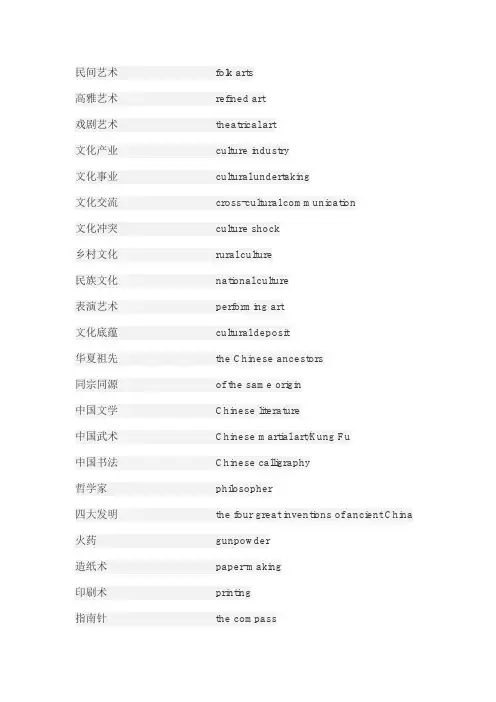
民间艺术folk arts高雅艺术refined art戏剧艺术theatrical art文化产业culture industry文化事业cultural undertaking文化交流cross-cultural communication文化冲突culture shock乡村文化rural culture民族文化national culture表演艺术performing art文化底蕴cultural deposit华夏祖先the Chinese ancestors同宗同源of the same origin中国文学Chinese literature中国武术Chinese martial art/Kung Fu中国书法Chinese calligraphy哲学家philosopher四大发明the four great inventions of ancient China 火药gunpowder造纸术paper-making印刷术printing指南针the compass四书the Four Books大学the Great Learning中庸the Doctrine of the Mean论语the Analects of Confucius孟子the Mencius孔子Confucius孟子Mencius老子Lao Tzu庄子Chuang Tzu墨子Mo Tzu孙子Sun Tzu中国画traditional Chinese painting水墨画Chinese brush painting; ink and wash painting武术门派styles or schools of martial art习武健身practice martial art for fitness古代格斗术ancient form of combat武林高手top martial artist气功Qigong; deep breathing exercises空手道karate拳击boxing击剑fencing跆拳道tae kwon do柔道judo中国武术协会Chinese Martial Art Association武侠小说tales of roving knights/kung fu novels汉学家sinologist偏旁部首radical笔画stroke中国热Sino mania汉语的四声调the four tones of Chinese characters平声level tone上声rising tone仄声falling-rising tone去声falling tone孙子兵法the Art of War西游记Journey to the West; Pilgrimage to the West三国演义Romanceof Three Kingdoms红楼梦Dreams of the Red Mansions水浒传Heroes of the Marshes; Tales of the Water Margin资治通鉴History as a Mirror春秋the Spring and Autumn Annals史记Historical Records诗经the Book of Songs; the Book of Odes书经the Book of History易经I Ching; the Book of Changes礼记the Book of Rites三字经three-character scripture/three-word chant 八股文eight-part essay/stereotyped writing五言绝句five-character quatrain七言律诗seven-character octave四合院quadrangle京剧Peking Opera独角戏monodrama杂技acrobatics相声witty dialogue comedy, standup comedy 马戏circus show哑剧pantomime; mime踩高跷stilt walk说书story-telling木偶戏puppet show口技ventriloquism京剧票友amateur performer of Peking Opera篆刻seal cutting图章seal工艺workmanship/craftsmanship手工艺品handicraft泥人clay figure唐三彩trio-colored glazed pottery of the Tang Dynasty陶器pottery苏绣Suzhou embroidery文房四宝the four stationary treasures of the Chinese study-a writing brush,an ink stick, an ink stone and paper寓言fable神话mythology传说legend十二生肖zodiac公历Gregorian calendar阴历lunar calendar对联antithetical couplet天干heavenly stem地支earthly branch闰年leap year二十四节气the twenty-four solar terms本命年one’s year of birth in the circle of twelve years传统节日traditional holidays春节Spring Festival元宵节Lantern Festival清明节Pure Brightness Festival端午节dragon boat festival中秋节Mid-Autumn Festival重阳节Double Ninth Day/the Aged Day才子佳人gifted scholars and beautiful ladies 中华文明Chinese civilization朝代dynasty中外学者Chinese and overseas scholars考古学家archaeologist人类学家anthropologist进化论Darwinism无神论atheism宿命论determinism启蒙运动enlightenment辩证的dialectic先知illuminati佛教Buddhism儒教Confucianism道教Taoism形而上学metaphysics寺庙temple孔庙temple of Confucius篆书seal script / seal character隶书…… official script行书running script草书…… cursive script楷书…… regular script拜年pay a new year visit爆竹、鞭炮firecracker除夕Eve of Chinese new year春联spring couplets辞旧迎新bring out the old year and ring in the new饺子boiled dumpling锅贴pot sticker庙会temple fair鸣钟辞旧岁ring out the old year年画traditional new year pictures年夜饭the eve feast / family reunion dinner on lunar new year's eve年终大扫除year end household cleaning守岁stay up late on the new year's eve压岁钱new year gift money / money given to children as a new year gift 舞龙dragon dance元宵sweet sticky rice dumplings花灯festival lantern灯谜lantern riddle狮子舞lion dance清明节Pure Brightness Festival扫墓perform sacrifices to one's ancestors or relatives祭祖offer sacrifices to the ancestors踏青go for an outing in spring赛龙舟dragon-boat race粽子pyramid shaped dumpling made by glutinous rice wrapped in reed or bamboo leaves亡灵departed soul忠臣loyal minister屈原the poet月饼moon cake赏月appreciate the glorious full moon登高climb mountain中药TCM(traditional Chinese medicine)秦始皇the first emperor / emperor Qin皇太后empress dowager汉高祖刘邦founder of the Han dynasty (206 B.C---220 A.D)文明摇篮cradle of civilization明清两代Ming and Qing dynasties中华文明Chinese civilization历史学家historian地理学家geographer江南水乡the south of the lower reaches of Yangtse River水乡景色riverside scenery1. 中国梦Chinese dream2.光盘行动Clear your plate campaign3. 倒逼reversed transmission of the pressure to get something done4. 逆袭counterattack under unfavorable circumstances5. 微XX micro-微博(microblog)、微新闻(micro news)、微电影(microfilm)6. 大V big V7. 女汉子tough girl, manly woman8. 土豪tuhao,nouveau rich9. 奇葩weirdo10. 点赞like。
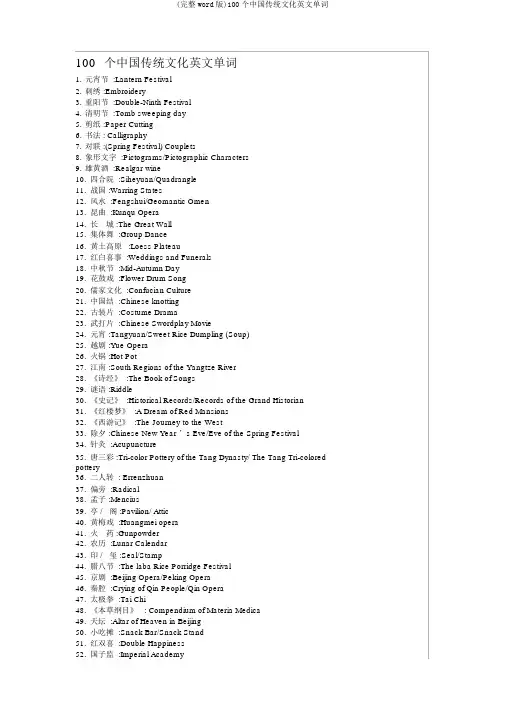
100个中国传统文化英文单词1.元宵节 :Lantern Festival2.刺绣 :Embroidery3.重阳节 :Double-Ninth Festival4.清明节 :Tomb sweeping day5.剪纸 :Paper Cutting6.书法 : Calligraphy7.对联 :(Spring Festival) Couplets8.象形文字 :Pictograms/Pictographic Characters9.雄黄酒 :Realgar wine10.四合院 :Siheyuan/Quadrangle11.战国 :Warring States12.风水 :Fengshui/Geomantic Omen13.昆曲 :Kunqu Opera14.长城 :The Great Wall15.集体舞 :Group Dance16.黄土高原 :Loess Plateau17.红白喜事 :Weddings and Funerals18.中秋节 :Mid-Autumn Day19.花鼓戏 :Flower Drum Song20.儒家文化 :Confucian Culture21.中国结 :Chinese knotting22.古装片 :Costume Drama23.武打片 :Chinese Swordplay Movie24.元宵 :Tangyuan/Sweet Rice Dumpling (Soup)25.越剧 :Yue Opera26.火锅 :Hot Pot27.江南 :South Regions of the Yangtze River28.《诗经》 :The Book of Songs29.谜语 :Riddle30.《史记》 :Historical Records/Records of the Grand Historian31.《红楼梦》 :A Dream of Red Mansions32.《西游记》 :The Journey to the West33.除夕 :Chinese New Year ’s Eve/Eve of the Spring Festival34.针灸 :Acupuncture35.唐三彩 :Tri-color Pottery of the Tang Dynasty/ The Tang Tri-colored pottery36.二人转 : Errenzhuan37.偏旁 :Radical38.孟子 :Mencius39.亭 / 阁 :Pavilion/ Attic40.黄梅戏 :Huangmei opera41.火药 :Gunpowder42.农历 :Lunar Calendar43.印 / 玺 :Seal/Stamp44.腊八节 :The laba Rice Porridge Festival45.京剧 :Beijing Opera/Peking Opera46.秦腔 :Crying of Qin People/Qin Opera47.太极拳 :Tai Chi48.《本草纲目》 : Compendium of Materia Medica49.天坛 :Altar of Heaven in Beijing50.小吃摊 :Snack Bar/Snack Stand51.红双喜 :Double Happiness52.国子监 :Imperial Academy53.春卷 :Spring Roll(s)54.莲藕 :Lotus Root55.罗盘 :Luopan56.故宫博物院 :The Palace Museum57.相声 :Cross-talk/Comic Dialogue58.五行 :Five Phases59.北京烤鸭 : Beijing Roast Duck60.《桃花扇》 :The Peach Blossom Fan61.木偶戏 :Puppet Show62.敦煌莫高窟 :Mogao Caves63.电视小品 :TV Sketch/TV Skit64.甲骨文 :Oracle Bone Inscriptions65.古筝 :Chinese Zither66.二胡 :Urheen67.门当户对 :Perfect Match/Exact Match68.《水浒》 : Water Margin/Outlaws of the Marsh69.端午节 :Dragon Boat Festival70. 文房四宝 : “The Four Treasure of the Study ” “Brush, Inkstick, Paper and Inkstone ”71.兵马俑 : Cotta Warriors/ Terracotta Army72.旗袍 :Cheongsam73.指南针 :Compass74.泼水节 :Water-Splashing Day75.馄饨 :Wonton76.花卷 :Steamed twisted rolls77.羊肉泡馍 :Pita Bread Soaked in Lamb Soup78.冰糖葫芦 :A stick of sugar-coated haws (or apples, etc.)79.八宝饭 :Eight-treasure rice pudding80.粉丝 :Glass Noodles81.豆腐脑 :Jellied bean curd82.小品 :Witty Skits83.孝顺 :To show filial obedience84.武术 :Wushu (Chinese Martial Arts)85.宣纸 :Rice Paper86.衙门 : Yamen87.叩头 :Kowtow88.中庸 :The way of medium(cf. Golden Means)89.牌楼 :Pailou (pai-loo)90.东坡肉 :Dongpo Pork91.中山陵 :The Sun Yat-sen Mausoleum92.秦淮河 :Qinhuai River93.玄武湖 :Xuanwu Lake94.夫子庙 :The Confucian Temple95.鸭血粉丝 :Duck blood and Vermicelli Soup96.盐水鸭 :Yanshuiya, or salted and baked duck97.大煮干丝 :Gansi98.小笼包 :Steamed buns99.明孝陵 :Ming Tomb100.云锦 :Nanjing brocade。
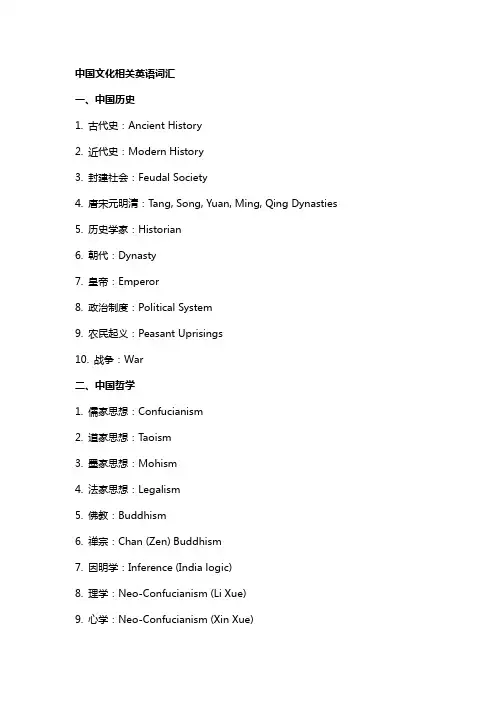
中国文化相关英语词汇一、中国历史1. 古代史:Ancient History2. 近代史:Modern History3. 封建社会:Feudal Society4. 唐宋元明清:Tang, Song, Yuan, Ming, Qing Dynasties5. 历史学家:Historian6. 朝代:Dynasty7. 皇帝:Emperor8. 政治制度:Political System9. 农民起义:Peasant Uprisings10. 战争:War二、中国哲学1. 儒家思想:Confucianism2. 道家思想:Taoism3. 墨家思想:Mohism4. 法家思想:Legalism5. 佛教:Buddhism6. 禅宗:Chan (Zen) Buddhism7. 因明学:Inference (India logic)8. 理学:Neo-Confucianism (Li Xue)9. 心学:Neo-Confucianism (Xin Xue)10. 先秦诸子:Pre-Qin thinkers (such as老子Laozi, 孔子Confucius, 孟子Mencius, 等)三、中国艺术1. 绘画:Painting (国画Traditional Chinese painting)2. 书法:Calligraphy (篆刻Seal cutting)3. 陶瓷:Ceramics (瓷器Porcelain)4. 玉器:Jadeware5. 雕刻:Sculpture (木雕Wood carving, 石雕Stone carving)6. 音乐:Music (传统音乐Traditional music)7. 舞蹈:Dance (民族舞Ethnic dance)8. 戏曲:Opera (京剧Peking Opera, 地方戏Local operas)9. 建筑:Architecture (园林Garden, 四合院Siheyuan)10. 中国结:Chinese knot四、中国文学1. 文言文:Classical Chinese (古文Ancient prose)2. 白话文:Colloquial language (白话文Vernacular Chinese)3. 诗歌:Poetry (古诗Ancient poetry, 新诗Modern poetry)4. 小说:Novel (古典小说Classical novels, 现当代小说Modern and contemporary novels)5. 散文:Prose (山水散文Landscape prose, 游记Travelogue)6. 剧本:Drama (戏曲Opera, 话剧Drama)7. 寓言:Fable (故事Story)8. 民间文学:Folk literature (传说Legend, 歌谣Ballad)9. 说唱艺术:Art of storytelling and ballad singing (评书Storytelling, 大鼓Great drum performance)10. 儿童文学:Children's literature (童话Fairy tale)。
中华传统文化英语六级翻译词汇关于中华传统文化英语六级翻译词汇传统文化是民族历史上各种思想文化、观念形态的`总体表征。
下面是店铺整理的中华传统文化英语六级翻译词汇,希望能帮到大家!儒家文化:Confucian Culture孟子:Mencius火锅:Hot Pot《诗经》: The Book of Songs《史记》: Historical Records/ Records of the Grand Historian 《西游记》: The Journey to the West《水浒》: Water Margin/Outlaws of the Marsh《红楼梦》: Dream of the Red Mansions《三国演义》:Three Kingdoms兵马俑:Cotta Warriour/ Terracotta Army唐三彩:Tri-color Pottery of the Tang Dynasty/ The Tang Tri-colored Pottery火药:Gunpowder印/玺:Seal/Stamp京剧:Beijing Opera/Peking Opera秦腔:Crying of Qin People/Qin Opera相声:Cross-talk/ Comic Dialogue电视小品:TV Sketches/TV Skit太极拳:Tai Chi天坛:Altar of Heaven in Beijing故宫博物馆:The Palace Museum敦煌莫高窟:Mogao Caves风水:Fengshui; geomantic omen阳历:Solar calendar阴历:Lunar calendar闰年:Leap year十二生肖:Zodiac春节:The Spring Festival元宵节:The Lantern Festival清明节:The T omb-sweeping Day端午节:The Dragon-boat Festival中秋节:The Mid-autumn Day重阳节:The Double-ninth Day七夕节:The Double-seventh Day春联:Spring couplets春运:The Spring Festival travel把中国的汉字“福”字倒贴在门上(听起来像是福到)预示新年有好运:Turn the Chinese character for luck (fu) upside down to make “dao”(which sounds like arrival) and put it on your door to bring in good fortune for the new year庙会:Temple fair爆竹:Firecracker年画:(traditional) New Year pictures压岁钱:New Year gift-money舞龙:Dragon dance舞狮:Lion dance元宵:Sweet sticky rice dumplings花灯:Festival lantern灯谜:Lantern riddle食物对于中国佳节来说至关重要,但甜食对于农历新年特别重要,因为他们能让新的一年更加甜蜜。
中国文化英文Chinese Culture: A Journey Through TimeChina is a country that possesses a rich and deep history which is reflected in its culture. The Chinese civilization is one of the oldest civilizations in the world, dating back over 5000 years. Chinese culture has undergone significant transformations throughout history, and it is a fascinating and intricate story to explore. This article takes you on a journey through the various aspects of Chinese culture.LanguageThe Chinese language is one of the oldest and most complex languages in the world. It is a tonal language, which means that the pitch and inflection of words determine their meaning. The written language has evolved over centuries and is composed of thousands of characters. These characters are not alphabetic, and each character represents a concept or word. Chinese calligraphy is an important aspect of the Chinese culture that is admired worldwide. Many consider it to be a form of art.PhilosophyChinese philosophy has contributed to various fields worldwide, including ethics, politics, and religion. Confucianism, Taoism, and Buddhism are three significant philosophical systems that have molded Chinese thought and behavior. Confucianism emphasizes morality, respect for elders, and social harmony, while Taoism emphasizes simplicity, humility, and nature. Buddhismis the third major school of Chinese philosophy that focuses on individual enlightenment and freedom from suffering.FoodChinese cuisine is one of the most versatile and diverse culinary styles globally. Traditional Chinese dishes use a wide range of ingredients, spices, and cooking methods. The most prominent styles of Chinese food include Sichuan, Cantonese, and Shanghai cuisine. Rice, noodles, and vegetables are some of the staple foods in the Chinese diet. Chinese food is also known for its use of seasonings such as soy sauce, five-spice powder, and sesame oil.ArtsChinese art is one of the oldest and most diverse in the world. Chinese art has a long history dating back to the Neolithic period. Calligraphy and painting are some of the most significant forms of traditional Chinese art. Chinese painters use silk or rice paper, which is the preferred medium for traditional Chinese painting. Chinese opera is another unique aspect of Chinese culture that involves acting, music, and stylized movements.MusicMusic plays a significant role in Chinese culture. Traditional Chinese music is diverse and ranges from classical pieces to folk songs. The Chinese music has a unique sound and is played using instruments such as the erhu, guzheng, and dizi. Chinese opera music is also an integral part of Chinese culture.Festivals and CelebrationsChinese festivals are an essential part of the culture and are celebrated throughout the year. Some of the most prominent festivals include Chinese New Year, the Lantern Festival, and the Mid-Autumn Festival. Chinese New Year is the most significant festival, and it is celebrated for 15 days. Chinese people celebrate the arrival of the new year by cleaning their homes, buying new clothes, and preparing food for family and friends.SportsChinese people have a long history of participating in sports, particularly martial arts. Tai Chi is one of the most popular martial arts in China, and it is practiced for its health benefits. Football, basketball, and table tennis are also popular sports in China.ConclusionChinese culture is an essential part of the world's cultural heritage. It has influenced many other cultures worldwide, particularly in East Asia. The culture is vibrant, diverse, and multifaceted, reflecting the rich history and traditions of the Chinese people. From the Chinese language to painting, music, and martial arts, this article provides an overview of some of the essential aspects of Chinese culture.。
用英文讲中国文化英语作文Title: The Rich Tapestry of Chinese CultureThe culture of China is one of the oldest and most complex in the world, shaped by thousands of years of history and diverse geographical regions. It encompasses a wide array of traditions, beliefs, arts, and customs that have evolved since ancient times. Chinese culture is not only profound but also remarkably influential across the globe, touching upon various aspects of human civilization from philosophy and religion to cuisine and martial arts.At the heart of Chinese culture lies its rich philosophical tradition. Teachings such as Confucianism, Taoism, and Buddhism have deeply influenced Chinese thought and daily life. Confucian ideals emphasize moral virtues, social harmony, and respect for education, while Taoism promotes living in harmony with the Tao, or the natural order of the universe. Buddhism, which arrived from India, enriched the spiritual life of China with its teachings on suffering, impermanence, and enlightenment. These philosophies have collectively instilled a sense of balance, moderation, and contemplation in Chinese society.Art is another vibrant aspect of Chinese culture, rangingfrom the intricate designs on traditional ceramics to the grandeur of calligraphy and painting. Chinese calligraphy is more than just a form of writing; it is considered a dance of the brush, where each stroke embodies strength, rhythm, and emotion. Paintings often feature landscapes, imbued with philosophical meanings and a deep appreciation for nature's beauty. Traditional Chinese music, with its unique pentatonic scale, has been used to create melodies that are both soothing and expressive, often accompanied by instruments such as the pipa, an ancestor of the modern guitar, or the erhu, atwo-stringed bowed instrument.Celebrations and festivals occupy a special place in Chinese culture, serving both as markers of the passage of time and as opportunities for family reunions. The Spring Festival, or Chinese New Year, is the most significant event, a time when people welcome the new lunar year with fireworks, feasting, and family gatherings. The Mid-Autumn Festival celebrates the harvest moon with the gifting and consumption of mooncakes, symbolizing unity and completeness. These occasions, along with others like the Dragon Boat Festival and Qingming Festival, showcase the importance of kinship and communal solidarity.Chinese cuisine is perhaps one of the most widespread and beloved elements of Chinese culture globally. It varies vastly by region, reflecting the country's vast geography and climate differences. Signature dishes like Peking duck from the north and spicy Sichuan fare from the southwest offer a taste of China's culinary diversity. Rice, noodles, tea, and soups are staples in everyday meals, demonstrating the Chinese emphasis on balance and healthfulness in diet.Martial arts, often referred to in the West as "kung fu," are a testament to the Chinese philosophy of physical and spiritual discipline. Styles like Tai Chi combine self-defense techniques with principles of meditation and inner peace, making them both a physical exercise and a spiritual practice. Other forms, such as Shaolin martial arts, highlight a combination of agility, strength, and aerobic stamina, showcasing the athleticism and grace inherent in these practices.In conclusion, Chinese culture is a magnificent mosaic of historical depth, artistic splendor, philosophical profundity, and communal harmony. Its influence stretches far beyond China's borders, captivating and inspiring people around the globe. As one delves into the rich tapestry of China's culturalheritage, it becomes evident that this ancient culture embodies enduring wisdom and a way of life that values balance, reflection, and continuity with the past while embracing modernity and innovation.。
中国文化常用的专出名词、动词短语、句子一、专出名词1. Chinese civilization /glorious culture 中华文明/绚烂的文明2. our timeworn civilization 我们古老的文明3. National heritage(tangible/intangible) 国家文化遗产〔有形或者无形〕4. Cultural relics 文化遗产5. Chinese folk stories 中国的民间故事6. historical sites 历史景点二、动词短语1. have a deep passion for /have a deep fascination with sth 宠爱2. have a keen interest in 感爱好3. experience sth in person. 亲自体验E.g. I hope you can experience this magical festival with us in person.4. expose yourself to sth 接触E.g. You will be exposed to a whole different culture and custom.5. gain a deep insight into sth 更好地了解gain a better glimpse into sthdeepen your understanding of our glorious cultureE.g. This activity will help you gain a better insight into our magnificent culture.E.g. This activity will deepen our understanding of our glorious culture.6. appreciate / admire / adore our magnificent culture 观赏/宠爱我们绚烂的文明E.g. I sincerely wish you can seize the opportunity to explore, enjoy and embrace our charming culture.7. arouse students’ interest in sth唤醒某人对…的爱好8. sth will add to the charm of this festival. 增加这个节日的魅力E.g. A Chinese painting show will add to the charm of this festival.9. sth have a history of XXX years 拥有多久的历史E.g. Suzhou has a history of 2,500 years.10. be soaked in Chinese culture 沉醉immerse yourself in Chinese culture沉醉E.g. You will be soaked in the enduring history of Chinese painting and calligraphy.11. get across to sb sth 让某人理解E.g. This activity will get across to you our magnificent culture.12. draw valuable lessons from 吸取阅历教训E.g. You can draw valuable lessons from this story.13. be deeply impressed by 被…深深震撼E.g. You will be deeply impressed by the special expertise of these craftsmen.14. be deeply rooted in 深深扎根于E.g. The Chinese character is deeply rooted in people's everyday life and experience.15. reap a lot from / harvest a lot from 收获很大E.g. I believe you will reap a lot from this trip.三、句子1. A variety of performances will be put on the stage, ranging from dancing and singing in contemporary style to traditional musical instrument performance with ancient elegance.句意:舞台上将有各种各样的表演,从现代风格的歌舞到古典优雅的传统乐器演奏。
用英语介绍中国传统文化pdf全文共3篇示例,供读者参考篇1Introduction to Traditional Chinese CultureChinese culture is one of the oldest and richest in the world, with a history that dates back thousands of years. It encompasses a wide range of traditions, customs, and practices that have been passed down through generations. In this document, we will explore some of the key aspects of traditional Chinese culture, including art, literature, philosophy, and food.ArtChinese art is diverse and multifaceted, encompassing a wide range of styles and mediums. Traditional Chinese painting, calligraphy, and pottery are highly esteemed for their beauty and elegance. Chinese artists often draw inspiration from nature, with landscapes, flowers, and animals being popular subjects. Traditional Chinese paintings are characterized by their use of brush strokes, ink washes, and vibrant colors.LiteratureChinese literature is one of the oldest and most influential in the world. The Chinese language is rich and expressive, allowing for a wide range of literary forms, including poetry, prose, and drama. Classic works such as "The Art of War" by Sun Tzu, "Journey to the West" by Wu Cheng'en, and "Dream of the Red Chamber" by Cao Xueqin are widely regarded as masterpieces of Chinese literature.PhilosophyChinese philosophy is deeply rooted in ancient texts such as the Confucian Analects, the Dao De Jing, and the works of Mencius. Confucianism, Daoism, and Buddhism are the three main philosophical traditions in China, each with its own unique beliefs and practices. Confucianism emphasizes moral values, filial piety, and social harmony, while Daoism focuses on living in harmony with nature and finding inner peace. Buddhism teaches the importance of compassion, mindfulness, and enlightenment.FoodChinese cuisine is known for its variety, flavor, and health benefits. Traditional Chinese cooking techniques includestir-frying, steaming, and braising, which help to preserve the natural flavors and nutrients of the ingredients. Popular ingredients in Chinese cuisine include rice, noodles, tofu,vegetables, and a wide range of meats and seafood. Some of the most famous Chinese dishes include Peking duck, dim sum, hot pot, and Mapo tofu.ConclusionTraditional Chinese culture is a rich and vibrant tapestry of art, literature, philosophy, and food. It has been shaped by thousands of years of history and continues to evolve and adapt in the modern world. By exploring the key aspects of Chinese culture, we can gain a deeper understanding of this ancient and fascinating civilization.篇2Introduction to Chinese Traditional CultureChinese traditional culture has a long history and has greatly influenced the development of Chinese society. It has accumulated and evolved over thousands of years, reflecting the wisdom, customs, values, and beliefs of the Chinese people. In this PDF, we will introduce some of the key aspects of Chinese traditional culture.1. ConfucianismConfucianism is a philosophical and ethical system that was founded by Confucius in the 5th century BC. It emphasizes the importance of moral values, social harmony, respect for elders, and the maintenance of proper relationships in society. Confucianism has had a profound impact on Chinese politics, education, and culture.2. TaoismTaoism is a philosophical and religious tradition that originated in China in the 4th century BC. It emphasizes living in harmony with the Tao, or the natural way of the universe. Taoist practices include meditation, martial arts, and the study of alchemy. Taoism has influenced Chinese art, literature, and medicine.3. Chinese CalligraphyChinese calligraphy is a highly esteemed art form in China that involves writing Chinese characters with a brush and ink. Calligraphy is considered a reflection of the calligrapher's personality and skill. It is often used in traditional Chinese painting, poetry, and seal carving.4. Chinese OperaChinese opera is a traditional form of performing arts that combines music, singing, acting, and acrobatics. There are several regional styles of Chinese opera, including Peking opera, Cantonese opera, and Sichuan opera. Chinese opera often depicts historical events, legends, and myths.5. Chinese FestivalsChinese festivals are an important part of traditional Chinese culture. Some of the most popular festivals include the Chinese New Year, the Lantern Festival, the Dragon Boat Festival, and the Mid-Autumn Festival. These festivals are celebrated with traditional customs, food, and performances.ConclusionChinese traditional culture is rich and diverse, encompassing a wide range of beliefs, practices, and art forms. It has been passed down from generation to generation and continues to be celebrated and cherished by the Chinese people. By studying and preserving Chinese traditional culture, we can gain a deeper understanding of the values and beliefs that have shaped Chinese society for centuries.篇3Chinese traditional culture is a rich and diverse heritage that has been passed down through generations. From literature and art to philosophy and customs, Chinese traditional culture encompasses a wide range of practices and beliefs that have shaped the country's identity.One of the most well-known aspects of Chinese traditional culture is Confucianism, a philosophy founded by Confucius that emphasizes the importance of ethical values such as benevolence, righteousness, and filial piety. Confucianism has had a profound influence on Chinese society, shaping everything from family relationships to government policies.Another important part of Chinese traditional culture is Chinese calligraphy, which is considered a high art form in China. Calligraphy has a long history in China, dating back thousands of years, and is prized for its beauty and expressiveness. Chinese calligraphy is not just a form of writing, but also a way of expressing one's emotions and personality.In addition to Confucianism and calligraphy, Chinese traditional culture also includes traditional Chinese medicine, martial arts, and traditional festivals such as the Chinese New Year and the Mid-Autumn Festival. These practices and beliefsare deeply rooted in Chinese society and continue to be celebrated and practiced by millions of people around the world.For those interested in learning more about Chinese traditional culture, there are many resources available, including books, websites, and PDF documents. These resources can provide valuable insights into the history, customs, and beliefs of Chinese traditional culture, allowing readers to gain a deeper understanding of this rich and vibrant heritage.In conclusion, Chinese traditional culture is a treasure trove of wisdom, artistry, and tradition that has been passed down through the ages. By exploring and learning about Chinese traditional culture, we can gain a greater appreciation for the values and beliefs that have shaped Chinese society for centuries.。
中国文化翻译-ChineseCulture1、中国酒文化Chinese Wine Culture中国人在7000年以前就开始用谷物酿酒。
总的来说,不管是古代还是现代,酒都和中国文化息息相关。
长久以来,中国的酒文化在人们生活中一直扮演着重要的角色。
我们的祖先在写诗时以酒助兴,在宴会中和亲朋好友敬酒。
作为一种文化形式,酒文化也是普通百姓生活中不可分割的部分,比如生日宴会、送别晚宴、婚礼庆典等。
Chinese people began to make spirits with grains seven thousand years ago. Generally speaking,wine has a close connection with culture in China in both ancient and modern times. Chinese wine culture has been playing a quite important role in Chinese people's life for a long time. Our Chinese ancestors used wine to enjoy themselves while writing poetry, or to make a toast to their relatives and friends during a feast. Wine culture, as a kind of culture form, is also an inseparable part in the life of ordinary Chinese people such as birthday party, farewell dinner, wedding, etc.2、中国书法Chinese Calligraphy中国书法历史悠久,它不仅是汉字的传统书写形式,也是体现自我修养和自我表达的艺术。
1. 元宵节: Lantern Festival2. 刺绣:embroidery3. 重阳节:Double-Ninth Festival4. 清明节:Tomb sweeping day5. 剪纸:Paper Cutting6. 书法:Calligraphy7. 对联:(Spring Festival) Couplets 8. 象形文字:Pictograms/Pictographic Characters 9. 人才流动:Brain Drain/Brain Flow10. 四合院:Siheyuan/Quadrangle 11. 战国:Warring States12. 风水:Fengshui/Geomantic Omen 13. 铁饭碗:Iron Bowl14. 函授部:The Correspondence Department15. 集体舞:Group Dance 16. 黄土高原:Loess Plateau17. 红白喜事:Weddings and Funerals18. 中秋节:Mid-Autumn Day 19. 结婚证:Marriage Certificate 20. 儒家文化:Confucian Culture 21. 附属学校:Affiliated school 22. 古装片:Costume Drama23. 武打片:Chinese Swordplay Movie24. 元宵:Tangyuan/Sweet RiceDumpling (Soup) 25. 一国两制:One Country, TwoSystems 26. 火锅:Hot Pot 27. 四人帮:Gang of Four28. 《诗经》:The Book of Songs 29. 素质教育:Essential-qualities-oriented Education30. 《史记》:Historical Records/Records of the Grand Historian31. 大跃进:Great Leap Forward(Movement) 32. 《西游记》:The Journey to the West33. 除夕:Chinese New Year’sEve/Eve of the Spring Festival34. 针灸:Acupuncture35. 唐三彩:Tri-color Pottery of theTang Dynasty/The TangTri-colored pottery36. 中国特色的社会主义:Chinese-characteredSocialist/Socialist with Chinesecharacteristics37. 偏旁:radical38. 孟子:Mencius39. 亭/阁:Pavilion/ Attic40. 大中型国有企业:Large andMedium-sized State-ownedEnterprises41. 火药:gunpowder42. 农历:Lunar Calendar43. 印/玺:Seal/Stamp44. 物质精神文明建设:TheConstruction of MaterialCivilization and Spiritual Civilization45. 京剧:Beijing Opera/Peking Opera46. 秦腔:Crying of Qin People/QinOpera47. 太极拳:Tai Chi48. 独生子女证:The Certificate ofOne-child49. 天坛:Altar of Heaven inBeijing50. 小吃摊:Snack Bar/Snack Stand51. 红双喜:Double Happiness52. 政治辅导员:PoliticalCounselor/School Counselor53. 春卷:Spring Roll(s)54. 莲藕:Lotus Root55. 追星族:Star Struck56. 故宫博物院:The Palace Museum57. 相声:Cross-talk/Comic Dialogue58. 下岗:Lay off/Laid off59. 北京烤鸭:Beijing Roast Duck60. 高等自学考试:Self-taughtExamination of Higher Education61. 烟花爆竹:fireworks andfirecracker62. 敦煌莫高窟:Mogao Caves63. 电视小品:TV Sketch/TV Skit64. 香港澳门同胞:Compatriots fromHong Kong and Macao65. 文化大革命:Cultural Revolution66. 长江中下游地区:The Mid-lowReaches of Yangtze River67. 门当户对:Perfect Match/ExactMatch68. 《水浒》:Water Margin/Outlawsof the Marsh69. 中外合资企业:Joint Ventures70. 文房四宝(笔墨纸砚):"The FourTreasure of the Study" "Brush,Inkstick, Paper, and Inkstone",有些英语,不能不懂装懂!——值得保留的an apple of love 西红柿(不是“爱情之果”)American beauty 一种玫瑰,名为“美国丽人”(不是“美国美女”)be taken in 受骗,上当(不是“被接纳”)bring down the house 博得全场喝彩(不是“推倒房子”)black tea 红茶(不是“黑茶”)black art 妖术(不是“黑色艺术”)black stranger 完全陌生的人(不是“陌生的黑人”)busboy 餐馆勤杂工(不是“公汽售票员”)busybody 爱管闲事的人(不是“大忙人”)blue stocking 女学者、女才子(不是“蓝色长统袜”)blind date (由第三者安排的)男女初次会面(并非“盲目约会”或“瞎约会”)capital idea 好主意(不是“资本主义思想”)China policy 对华政策(不是“中国政策”)Chinese dragon 麒麟(不是“中国龙”)confidence man 骗子(不是“信得过的人”)criminal lawyer 刑事律师(不是“犯罪的律师”)dead president 美钞(上印有总统头像)(并非“死了的总统”)dry goods (美)纺织品;(英)谷物(不是“干货”)dressing room 化妆室(不是“试衣室”或“更衣室”)eat one's words 收回前言(不是“食言”)English disease 软骨病(不是“英国病”)eleventh hour 最后时刻(不是“十一点”)familiar talk 庸俗的交谈(不是“熟悉的谈话”)French chalk 滑石粉(不是“法国粉笔”)Greek gift 害人的礼品(不是“希腊礼物”)green hand 新手(不是“绿手”)handwriting on the wall 不祥之兆(不是“大字报”)have a fit 勃然大怒(不是“试穿”)have the heart to do (用于否定句)忍心做……不是“有心做”或“有意做”)heartman 换心人(不是“有心人”)horse sense 常识(不是“马的感觉”)Indian summer 愉快宁静的晚年(不是“印度的夏日”)in one's birthday suit 赤身裸体(不是“穿着生日礼服”)lover 情人(不是“爱人”)mad doctor 精神病科医生(不是“发疯的医生”)personal remark 人身攻击(不是“个人评论”)pull up one's socks 鼓起勇气(不是“提上袜子”)red tape 官僚习气(不是“红色带子”)rest room 厕所(不是“休息室”)sporting house 妓院(不是“体育室”)sweet water 淡水(不是“糖水”或“甜水”)service station 加油站(不是“服务站”)Spanish athlete 吹牛的人(不是“西班牙运动员”)think a great deal of oneself 高看或看重自己(不是“为自己想得很多”)white coal (作动力来源用的)水(不是“白煤”)white man 忠实可靠的人(不是“皮肤白的人”)yellow book 黄皮书(法国政府报告书,以黄纸为封)(不是“黄色书籍”)pull one's leg 开玩笑(不是“拉后腿”)make one's hair stand on end 令人毛骨悚然—恐惧(不是“令人发指,气愤”)What a shame! 多可惜!真遗憾!(不是“多可耻”)You don't say! 是吗!(不是“你别说”)You can say that again! 说得好!(不是“你可以再说一遍”)I haven't slept better. 我睡得好极了。
(不是“我从未睡过好觉”)You can't be too careful in your work. 你工作越仔细越好。
(不是“你工作不能太仔细”)It has been 4 years since I smoked. 我戒烟4年了。
(不是“我抽烟4年了”)All his friends did not turn up. 他的朋友没全到。
(不是“他的朋友全没到”)People will be long forgetting her. 人们在很长时间内会记住她的。
(不是“人们会永远忘记她”)He was only too pleased to let them go. 他很乐意让他们走。
(不是“他太高兴了,不愿让他们走”)It can't be less interesting. 它无聊极了。
(不是“它不可能没有趣”)1.in the long run 从长远来看,最后2.on offer 在出售中3.choose from... 从...中挑选4.be curious about... 对...感到好奇5.confront with... 使面临, 使面对6.with interest 有兴趣地7.an average of ... 平均是...8.at high altitudes 在很高的地方9.draw one’s attention 吸引某人的注意10.focus on 集中11.in years to come 在未来的几年内12.as a matter of fact 实际上13.adopt a positive approach 采取一种正确的方法14.wait for 等待15.pass through 经过, 通过16.a sequence of 一系列的17.set apart from 把...区分开18.take ... for granted 以...为骄傲19.be aware of/that 注意到20.translate into 翻译成21.set in 开始22.intend to do 想要做23.looking forward to 期望24.be built from... 用...去建造25.a wide variety of 很多的26.at advanced levels 在高级范围内27.carry out 完成,实施28.according to 根据29.aim to do 指望做某事30.make sacrifices to do 做出牺牲而做31.in depth 深入地32.a series of 一系列,一连串33.above all 首先,尤其是34.after all 毕竟,究竟35.ahead of 在...之前36.ahead of time 提前37.all at once 突然,同时38.all but 几乎;除了...都39.all of a sudden 突然40.all over 遍及41.all over again 再一次,重新42.all the time 一直,始终43.all the same 仍然,照样的44.as regards 关于,至于45.anything but 根本不46.as a matter of fact 实际上47.apart from 除...外(有/无)48.as a rule 通常,照例49.as a result(of) 因此,由于50.as far as ...be concerned 就...而言51.as far as 远至,到...程度52.as for 至于,关于53.as follows 如下54.as if 好像,仿怫55.as good as 和...几乎一样56.as usual 像平常一样,照例57.as to 至于,关于58.all right 令人满意的;可以59.as well 同样,也,还60.as well as 除...外(也),即...又61.aside from 除...外(还有)62.at a loss 茫然,不知所措63.at a time 一次,每次64.at all 丝毫(不),一点也不65.at all costs 不惜一切代价66.at all events 不管怎样,无论如何67.at all times 随时,总是68.at any rate 无论如何,至少69.at best 充其量,至多70.at first 最初,起先71.at first sight 乍一看,初看起来72.at hand 在手边,在附近73.at heart 内心里,本质上74.at home 在家,在国内75.at intervals 不时,每隔... 76.at large 大多数,未被捕获的77.at least 至少78.at last 终于79.at length 最终,终于80.at most 至多,不超过81.at no time 从不,决不82.by accident 偶然83.at one time 曾经,一度;同时84.at present 目前,现在85.at sb's disposal 任...处理86.at the cost of 以...为代价87.at the mercy of 任凭...摆布88.at the moment 此刻,目前89.at this rate 照此速度90.at times 有时,间或91.back and forth 来回地,反复地92.back of 在...后面93.before long 不久以后94.beside point 离题的,不相干的95.beyond question 毫无疑问96.by air 通过航空途径97.by all means 尽一切办法,务必98.by and by 不久,迟早99.by chance 偶然,碰巧100.by far 最,...得多101.by hand 用手,用体力102.by itself 自动地,独自地103.by means of 用,依靠104.by mistake 错误地,无意地105.by no means 决不,并没有106.by oneself 单独地,独自地107.by reason of 由于108.by the way 顺便说说109.by virtue of 借助,由于110.by way of 经由,通过...方法111.due to 由于,因为112.each other 互相113.even if/though 即使,虽然114.ever so 非常,极其115.every now and then 时而,偶尔116.every other 每隔一个的117.except for 除了...外118.face to face 面对面地119.far from 远非,远离120.for ever 永远121.for good 永久地122.for the better 好转123.for the moment 暂时,目前124.for the present 暂时,目前125.for the sake of 为了,为了...的利益126.for the time being 暂时,眼下127.from time to time 有时,不时128.hand in hand 手拉手 ,密切关联129.head on 迎面地,正面的130.heart and soul 全心全意地131.how about ...怎么样132.in a hurry 匆忙,急于133.in case of 假如,防备134.in a moment 立刻,一会儿135.in a sense 从某种意义上说136.in a way 在某种程度上137.in a word 简言之,总之138.in accordance with 与...一致,按照139.in addition 另外,加之140.in addition to 除...之外(还) 141.in advance 预先,事先142.in all 总共,合计143.in any case 无论如何144.in any event 无论如何145.in brief 简单地说146.in charge of 负责,总管147.in common 共用的,共有的148.in consequence(of) 因此;由于149.in debt 欠债,欠情150.in detail 详细地151.in difficulty 处境困难152.in effect 实际上,事实上153.in general 一般来说,大体上154.in favor of 支持,赞成155.in front of 面对,在...前156.in half 成两半157.in hand 在进行中,待办理158.in honor of 为庆祝,为纪念159.in itself 本质上,就其本身而言160.in line with 与...一致161.in memory of 纪念162.in no case 决不163.in no time 立即,马上164.in no way 决不165.in order 按顺序,按次序166.in other words 换句话说167.in part 部分地168.in particular 特别,尤其169.in person 亲自,本人170.in place 在合适的位置171.in place of 代替,取代,交换172.in practice 在实践中,实际上173.in proportion to 与...成比例174.in public 公开地,当众175.in quantity 大量176.in question 正在谈论的177.in regard to 关于,至于178.in relation to 关于,涉及179.in return 作为报答/回报/交换180.in return for 作为对...报答181.in short 简言之,总之182.in sight 被见到;在望183.in spite of 尽管184.in step 齐步,合拍185.in step with 与...一致/协调186.in tears 流着泪,在哭着187.in the course of 在...期间/过程中188.in the distance 在远处189.in the end 最后,终于190.in the event of 如果...发生,万一191.in the face of 即使;在...面前192.in the first place 首先193.in the future 在未来194.in the least 丝毫,一点195.in (the)light of 鉴于,由于196.in the way 挡道197.in the world 究竟,到底198.in time 及时199.in touch 联系,接触200.in turn 依次,轮流;转而201.in vain 徒劳,白费力202.instead of 代替,而不是203.just now 眼下;刚才204.little by little 逐渐地205.lots of 许多206.many a 许多207.more or less 或多或少,有点208.next door 隔壁的,在隔壁209.no doubt 无疑地210.no less than 不少于...;不亚于... 211.no longer 不再212.no more 不再213.no more than 至多,同...一样不214.none other than 不是别的,正是215.on one's guard 警惕,提防216.nothing but 只有,只不过217.now and then 时而,偶尔218.off and on 断断续续,间歇地219.off duty 下班220.on a large/small scale 大/小规模地221.on account of 由于222.on(an/the) average 平均,通常223.on behalf of 代表224.on board 在船(车/飞机)上225.on business 因公226.on condition that 如果227.on duty 上班,值班228.on earth 究竟,到底229.on fire 起火着火230.on foot 步行,231.on guard 站岗,值班232.on hand 在场,在手边233.on occasion(s) 有时,间或234.on one's own 独立,独自235.on purpose 故意地236.on sale 出售,廉价出售237.on schedule 按时间表,准时238.on second thoughts 经重新考虑239.on the contrary 正相反240.on the grounds of 根据,以...为由241.on (the) one hand 一方面242.on the other hand 另一方面243.on the point of 即将...的时刻244.on the road 在旅途中245.on the side 作为兼职/副业246.on the spot 在场;马上247.on the whole 总的来说,大体上248.on time 准时249.once again 再一次250.once(and)for all 一劳永逸地251.once in a while 偶尔252.once more 再一次253.once upon a time 从前254.one another 相互255.or else 否则,要不然256.or so 大约,左右257.other than 非;除了258.out of 从...中;由于;缺乏259.out of breath 喘不过气来260.out of control 失去控制261.out of date 过时的262.out of doors 在户外263.out of order 出故障的264.out of place 不适当的265.out of practice 久不练习,荒疏266.out of sight 看不见,在视野外267.out of the question 毫无可能的268.out of touch 不联系,不接触269.over and over(again) 一再地,再三地270.prior at 在...之前271.quite a few 相当多,不少272.rather than 不是...(而是) 273.regardless of 不顾,不惜274.right away 立即,马上275.side by side 肩并肩,一起276.so far 迄今为止277.sooner or later 迟早,早晚278.step by step 逐步地279.such as 例如,诸如280.thanks to 由于,多亏281.that is (to say) 就是说,即282.to the point 切中要害,切题283.under control 处于控制之下284.under the circumstances 这种情况下285.up to date 在进行中286.up to 多达;直到;胜任;取决于287.what if 切合目前情况的288.what about 怎么样289.with respect to 如果...将怎么样290.with regard to 关于,至于291.without question 关于,至于, 292.with the exception of 除...之外293.without question 毫无疑问2. I quit! 我不干了!3. Let go! 放手!4. Me too.我也是。